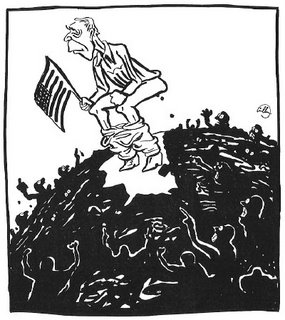 From the Dissensus board:
From the Dissensus board:The rendering of Al-Qaeda into an irrational monster is a necessary slight of hand for the leaders in America and the UK, to create an enemy who fights without reason, who can never be negotiated with, which is pure poppycock. But of course, vital to allowing them to continue to pursue what amount to imperialist policies in the Middle East. In saying they must be, in effect, insane, there is an immediate closing down of any attempts to locate reasons for their activities, which whilst you may not agree with them (or view them as proportionate) do exist.
Certainly (and as any CIA analyst will tell you, "Al-Qaeda" was a term coined by the CIA in the early-1990s as a blanket description of those groups positioned in Afghanistan opposed to US foreign policy in the Middle East, with particular reference to Bin Laden's efforts to have US military bases removed from Saudi Arabia. It was never a rigidly-controlled, hierarchical, "multi-national" organisation, but after 9/11 and the Afghan/Iraqi invasions it quickly became a grass-roots spontaneous mass movement).Chalmers Johnson, one of the best analysts anywhere of US foreign policy, briskly described the basis for asymmetric terrorism (Blowback) like that of Al-Qaeda a few years ago: "Blowback" is a CIA term. It was first invented after the CIA intervention against the government of Iran in 1953 when we overthrew an elected government there for the interests of the British and American petroleum industries. Blowback refers to the unintended consequences of clandestine policies that have been kept secret from the American public. I think it's important to stress that any policy may have unintended consequences, but here we're talking about unintended consequences of policies that the public knows nothing about, therefore, has no context within which to place them, and ends up with a daffy president going around asking, "Why do they hate us?"
Johnson: "My analysis was that the things we had done during the cold war, and the first decade after the cold war, were generating almost uncontrollable blowback. I did not, obviously, specifically anticipate anything like 9-11, but I certainly did anticipate and predict terrorist acts against Americans-military and civilian, abroad and at home-and therefore, was not particularly surprised when the attacks came on the World Trade Center and the Pentagon in September of 2001. At the time, I did not think that they were necessarily Islamic terrorists; I thought they could have been from Argentina, Chile, Indonesia, Okinawa, Greece, or any number of places on earth where we have carried out clandestine activities that unquestionably generate hostility toward the United States."
Chamers Johnson continues:
First of all, I think the obvious thing right now is our mistaken reaction to 9-11. It became almost taboo in this country after 9-11 to even ask what the motives of the attackers were. The public has now been so confused by lies from our government that they believe Saddam Hussein was the one behind it. Of course, we know he wasn't, and since there is no evidence that he could have been, the people have gotten that idea only from listening to the disinformationthat comes from the White House and the Pentagon.A Note on Johnson: Chalmers Johnson served in the Navy during the Korean War. He earned his Ph.D. in political science at UC Berkeley and taught there and at UC San Diego until 1992. He served as chairman of the Center for Chinese Studies and was elected a fellow of the American Academy of Arts and Sciences. Chalmers Johnson is president and co-founder of the Japan Policy Research Institute (www.jpri.org). He has written numerous articles and reviews and twelve books on Asian subjects, including, Peasant Nationalism and Communist Power, MITI and the Japanese Miracle, and Blowback: The Costs and Consequences of American Empire. His latest book is titled, The Sorrows of Empire: Militarism, Secrecy, and the End of the Republic.
September 11th was not an attack on America's values or America's democracy or America's wealth. It was an attack on American foreign policy and there were some fairly obvious things that should have been done at once which would have defused the situation. First, we should have withdrawn the troops at once that we had based in Saudi Arabia. Since the first war with Iraq in 1991, they were just exacerbating the situation rather than serving any real function. Second, we should have said that we do support the continuity of the state of Israel, but we do not support Israeli Zionist imperialism. And that until the settlements in the West Bank are closed-which are a cancer working on Israeli society in a destructive manner-we're going to cease our continued bankrolling of Israel, both financially and militarily. Last, we should have instituted at once a crash program of fuel conservation that could have easily eliminated our dependence on Persian Gulf petroleum imports.
We didn't do any of those things. Instead, we set out to use our massive military power against two peculiarly puny and defenseless targets-Afghanistan and Iraq-producing untold misery. This will without question generate and recruit more people committed to the idea of attacking the United States.
The Department of Defense has said for years that nobody can meet us militarily except in one of two ways: one, with the use of nuclear weapons, which would deter us; and the other is what they call, in typical Pentagon jargon, "asymmetrical warfare," meaning the weak attacking the super powerful via terrorism. There is every reason to anticipate that we will have more terrorism as we increasingly sink into the two quagmires that we have created in Afghanistan and Iraq.



No comments:
Post a Comment